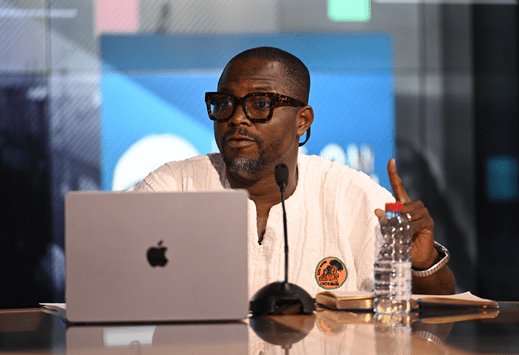By Evelyn ARTHUR
The President of the Customs Brokers Association, Ghana (CUBAG) and a leader of the Council of Freight Forwarder Associations (CoFFA), Nana Fredua Agyemang Ofori-Atta, has indicated that the World Customs Organization’s training on the Rules of Origin is a key step in helping Ghanaian businesses take advantage of AfCFTA.
According to him, AfCFTA could be the game changer for Ghana and Africa, but we must commit to continuous learning and collaboration to make it a reality.
Speaking on Eye on Port program, Mr. Ofori-Atta disclosed that much work remains to be done to ensure that all stakeholders, especially those in the private sector, are adequately prepared to leverage the benefits of the agreement.
He praised the recent World Customs Organization (WCO) training on the Rules of Origin, describing the training under the Africa Continental Free Trade Area (AfCFTA), as “ground-breaking.”
He said the initiative is a pivotal moment for Ghana’s private sector, as it enhances the capacity of freight forwarders to facilitate Africa-wide trade more effectively.
Mr. Ofori-Atta highlighted that this marks the first time that such comprehensive training has been extended to private sector players like freight forwarders.
He noted that prior to this, training had primarily focused on regulators, leaving intermediaries like freight forwarders without the necessary skills to fully comply with or benefit from trade agreements.
“It took two trips to the WCO and multiple rounds of discussions to secure this training. It’s truly ground-breaking because it fills a critical knowledge gap,” he explained.
The training, which focused on understanding the Rules of Origin within the AfCFTA framework, aims to ensure that freight forwarders are well-equipped to classify products accurately based on their origin, allowing them to benefit from preferential customs duties.
The AfCFTA, Nana Fredua pointed out, is an improvement over the ECOWAS Trade Liberalisation Scheme (ETLS), as it expands trade opportunities beyond West Africa to the entire African continent.
“The stakes are much higher now, and the need for widespread participation in AfCFTA is crucial for its success,” he said.
One of the major challenges, Mr. Ofori-Atta noted, is the complexity involved in determining the origin of goods. He cited an example of a locally made fugu shirt, where the cotton fibre could be sourced from Egypt, turned into yarn in another African country, and finally made into fabric in Ghana.
“To qualify for AfCFTA preferential rates, we need to ensure that the product is sufficiently transformed in Africa and adheres to the accumulation principle, where different stages of production across multiple African countries are recognized,” he explained.
Mr. Ofori-Atta stressed that failure to understand and apply these rules properly could hinder trade facilitation and prevent businesses from taking advantage of lower customs duties.
He shared that previously, only limited training opportunities were available, and even then, the costs were prohibitive.
“Two years ago, the cost for Rules of Origin training was around GH¢15,000 per head, and it could be as high as GH¢30,000 today. We’ve managed to run this training for free for our members because of how important it is,” he stated.
Although this training marks a significant step forward, Nana Fredua believes that it is only the beginning. “We were given a quota of 30 participants for the WCO training, but we managed to train 39 companies.
This is just the start. We will continue to train as many people as possible,” he promised, emphasizing that continuous education is crucial for keeping pace with evolving trade agreements. He also revealed plans to implement a “trainer of trainers” program to ensure that freight forwarders nationwide—from Elubo to Aflao—are adequately trained.
When asked to rate the current level of understanding among freight forwarders regarding the Rules of Origin, Ofori-Atta gave a cautious assessment. “For those who have undergone training, I’d say we’re at an intermediate level. But for the general freight forwarding community, the level of understanding is marginal. We still have a long way to go,” he admitted, rating the sector’s overall knowledge between six and seven out of ten.
The Executive of CoFFA Nana Fredua spoke about the broader potential of AfCFTA to transform Ghana’s economy. He urged the country to identify industries where it holds a natural competitive advantage, such as cocoa production, and to build value chains that maximize the benefits of intra-African trade.
“Between Ivory Coast and Ghana, we’re the largest exporters of cocoa, but we receive less than a tenth of the global revenue from the product. AfCFTA presents an opportunity for us to change that by creating African-wide value chains,” he emphasized.
He also highlighted the importance of private sector participation in realizing AfCFTA’s potential. “The agreement alone won’t make a difference unless businesses actively engage in transforming raw materials into value-added products. Whether it’s cocoa, minerals, or oil, we need to find ways to add value within Africa before the final product leaves the continent,” he explained.
Nana Fredua concluded by expressing optimism about AfCFTA’s ability to boost intra-African trade and shift Ghana’s economy from its current reliance on imports.
“Africa trades the least with itself, but AfCFTA gives us the opportunity to change that. We have the potential to become the largest free trade area in the world, and Ghana must position itself to benefit fully,” he said.










